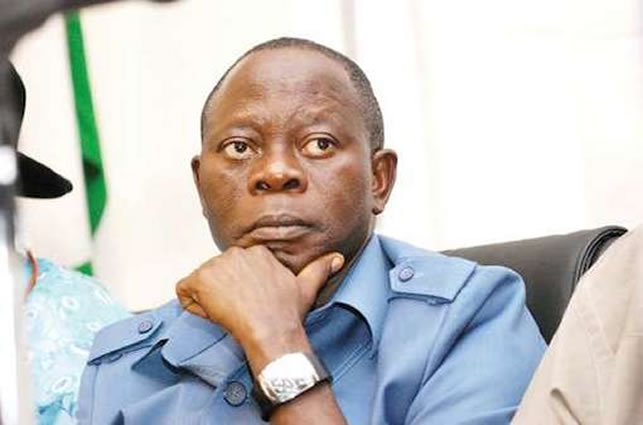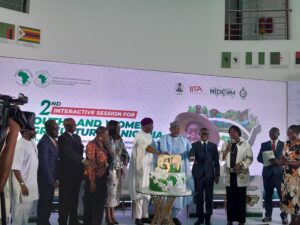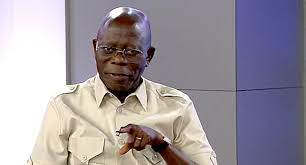Economy
Oshiomhole to FG: Don’t Use PENCOM Funds to Finance Budget Deficits

- Urges President to rejig security apparatus
- We’ll consolidate on our achievements – Buhari
By Mathew Dadiya, Abuja
The National Chairman of the All Progressive Congress (APC), Adams Oshiomhole on Wednesday, warned against the use of Pension Commission’s(PENCOM) funds to tackle budget deficits, since it was meant to address the critical issues of the masses who contributed the money.
The APC National Chairman said this in a remark at the first Presidential Policy Retreat organized by the APC administration.
Oshiomhole, therefore, called for a complete overhaul of the President’s economic policies to address inequalities and tackle poverty.
Oshiomhole who lamented that poverty has continued to ravaged Nigerians despite efforts by the current administration to address the scourge, urged governments to stop the use of PENCOM funds as stop gap measures to fund budget deficits and facility for infrastructure development by both Federal and State governments.
President Muhammadu Buhari had declared the retreat open.
Oshiomhole also called for rejig of security architecture in the country.
He urged the retreat to brainstorm towards getting practical solutions to the problems facing Nigeria.
On corruption, he urged the government to effectively plug leakages with all the Ministries Departments and Agencies reviewing ‘how’s to achieve it.
Oshiomhole also recommended long term national economy plan to replace the current Economic Growth and Recovery Plan.
Acknowledging that so much progress has been made in the past four years in the fight against corruption, economy and security, he said there were still huge challenges and room for improvement.
“The logic behind introducing the pension scheme under PENCOM, was that the workers’ social capital that they deducted every month which they would not need to draw on until they retire about 30 years or 35 years later, provide a basis for long term fund,” he explained.
Oshiomhole while speaking further, said: Happily, PENCOM has generated over five to six trillion naira since it commenced operation. Unfortunately, the money is borrowed by government both federal and state and unfortunately it is not available to address the social purpose of the working people whose contributions the pension fund evolved.
“I asked our expert to recognize that the primary purpose of the workers social capital is that it would be creatively managed and deployed to workers social needs including housing, education and all the other factors.
“It wasn’t meant to fund government’s deficit, it wasn’t meant to support federal government deficit it was meant to address the primary social purpose of those who work, so that they are sure that by the time they finished their employment that they are retired, they have a modest home to retire to.
“I think we must visit these issues, address them because this President if he has opposition he is among the rich, if he has supporters he is among the poor. The poor people’s money must be used to addressed the critical challenges of the poor.
“May God drive our thoughts, our processes and rejig everything so that at the end of the day, those people would say yes sai Baba! We elected him, we trusted him and he has delivered.” he said
On the economy, he noted that there is the challenge of high rate of poverty in spite of all the efforts and in spite of coming out of recession.
He also pointed out that the rate of economic growth is still far less than the rate of population growth.
“If our economic growth rate is still lower than the rate of population growth poverty would remain endemic. On the economy, there is the challenge of high rate of poverty, inequality, access to credit and mortgage.
“Mr President, I know deep in your heart and assessing the basis of our campaign the issue of inequality is primary. We don’t just want to grow the economy, create more wealth, we are also interested in who is benefiting from this wealth and what policy instruments are required to ensure that inequality is addressed and that the average Nigerian people particularly the masses that constitutes the electorate, benefit from the fruit of growth.”
This, he said, will require a review of access to credit and access to mortgage, unemployment, low level of manufacturing cost and the need for diversification of the economy.
He said there is also need to increase revenue, block leakages and ensure budgets deliver services to the citizens.
He added “I am happy that the National Assembly is here because part of the challenges we have faced over the past five years, is that even though we had control in terms of membership of the National Assembly but we had our budgets been passed five months into the new year.
“Even that fact alone by itself explained challenges at the level of execution of budget.”
On anti corruption, Oshiomhole said “I believe that we can commendably beat our chests as to the extent to which we have gone in implementing our anti-corruption war but there is need to ensure that our range of actions covers prevention – that is system, involvement of the Nigerian citizens, the society, and the prosecution of offenders.
“There are many who have said that we should not just pursue corruption, we should deal with how to even prevent it. Many wondered how can a salary earner who desire to have a house but who is paid in 30 days interval where they are paid regularly and he earns a million a month that is even to put the number generously. How can he own a house, if a house cost as much as 10 million naira?” he queried
Stressing that the banking system is not delivery to the ordinary people, adding access to credit remained a major issue.
“Let me share my own ignorance, I am unable to understand for example as a worker why in Europe when they are in economic recession they reduce their interest rate, in Nigeria when we are in recession we increase our interest rate. How do we price money at such level and expect that the ordinary people can borrow to set up businesses?
“We do need practical solutions beyond theories. We need to re-examining our condition what we saw different from what we see elsewhere in the world.
“If you want to buy a car Mr President, you must have twenty million to pay cash, to have twenty million to pay cash if you are not a big businessman it cannot possibly come from a legitimate salary given the known salary structure in the Nigerian public sector and even the disclosed portion of the Nigerian private sector.
“So if people desire to buy a car and the banking system is not open to credit the only way is to steal in order to purchase. But we have all travelled round the world, ten percent is enough to own a car if you have verifiable job and a banking history and you pay in installment, month by month until you deferred the car.
“As a worker you know the benefit of that if you don’t work and you are fired that car would be recovered by insurance company or whoever is the lender.
So we do need to review all of these so that in dealing with corruption, we deal with the preventive part.
“This retreat should critically review our achievements in the first term and map out strategy for the second term. What we hope to achieve in this Next Level Agenda is clear – challenges, how it should be done. This is why I want to challenge us to look at the following issues amongst others.” he said
Oshiomhole went on “The need for a long term national development plan to replace the Economic Recovery and Growth Plan which is expected to end in the next few years.
“The need to improve our revenue through blocking leakages and ensuring that every revenue agency remits to the federation account what is due in a timely manner.
“Of course, in this we must commend the President for introducing the Treasury Single Account (TSA). But as operators would tell you this policy is there but we must improve our strategy to ensure that leakages that are still there are effectively blocked.
“So the issue is how? The need for every ministry, departments and agencies to have a strategy plan to review the question of how because to be honest, everybody knows what is wrong. Even more importantly everybody knows what we ought to do, the challenge is one word – how?
“We know we have a huge number of unemployed people we know there is a need to have them back to work but the question is how?
So the need to put an effective coordinating mechanism to ensure policy coherence and coordination between arms and tiers of government.
“We need to radically change the budget contents, we need to do everything possible to reduce the recurrent expenditure from the current 70 percent and increase the budgetary allocation to the four sectors that are part of the life of citizens. Namely the health sector, education, agriculture, infrastructure.
“The more money we spend on recurrent, the less that is available for these critical areas.
It is not acceptable that we spend 80 percent on recurrent and we have some of our children in some states being taught under the tree even during this raining season.
“There is need for radical decisions to change this so that those millions of poor people who we saw across the states who fanatically believe in the person of our president and through the president, connect with our party, we must put appropriate policies in place to ensure that at the end of the day we can measure how all of the things we have done or we are going to do at the end of the four years has impact on their quality of lives.
“We need to implement anticorruption strategy in a comprehensive manner that would evolve the system, society and sanction.”
On security architecture, he said “The need to rejig the security apparatus and operational use community policing which is already being discussed but I think we need to go into the specific on the issue of “how.”
“Because every minute, every second is going as a party founded on the philosophy of social democracy we need to expand programmes that touch on the lives of such as the social housing, social investment programme, access to public healthcare, access to public education and support to small scale industries.” he said.
“The outcomes of this Policy Dialogue will be wholly advisory and implementation will be left to the federal machinery of Government.” he said
Those at the retreat included Vice President Yemi Osinbajo, Secretary to the Government of the Federation, Boss Mustapha, Aliko Dangote, Jim Ovia and former Prime Minister of Ethiopia, Hailemariam Desalegn.
State governors included those of Kebbi, Plateau, Kano, Kaduna, Kogi, Imo, Bauchi, Ekiti, Edo, Borno and Lagos.
President Buhari, while declaring the retreated open, noted that his administration came into office in 2015 at a period of economic recession following sharp drop in the global oil price and years of economic and financial mismanagement.
He maintained that his administration would consolidate on the successes achieved in his first term.
The president said his administration restored economic growth, curbed inflation and shored up external reserves through various monetary and fiscal measures.
He said that his administration has witnessed eight quarters of consistent marginal growth of the economy over the past two and a half years.
“We have made progress in the agricultural sector especially in food production and processing through our Food Security and Anchors Borrowers Programmes, which provide concessionary credit facilities to farmers in crop production as well as large-scale investors in food processing and manufacturing.
“To consolidate on these and other successes, we will continue to provide incentives that will facilitate investments and create jobs in key import substitution programmes.
“In line with the “Next Level Strategy” of our party, the All Progressives Congress, which seeks to consolidate on our achievements over the past four years, this policy dialogue session has been conceived to; “Advise the government over the next four years to deliver on our promises in a manner that reflects true changes to the livelihood of the people.
“Discuss and propose for Federal Government’s approval, key strategies and high impact initiatives to stimulate economic growth and development.”
Concerted effort, he said, requires the convergence of various stakeholders cutting across the private sector, developmental partners, industry experts to dialogue and forge a way forward.
He said his administration is committed to consolidating the successes of the first term and creating an avenue where the Nation’s investments and resources are geared towards sustainable development.
“We will implement structures that will accelerate speedy execution of these initiatives.
Economy
Selloffs in Banking Stocks Dip Market Capitalisation by N68bn

The Nigerian Exchange Ltd. (NGX) market capitalisation declined further on Wednesday by 0.12 per cent or N68 billion, following selloffs in Tier-one banking stocks.
The market capitalisation, which opened at N56.898 trillion, closed at N56.830 trillion.
The All-Share Index also shed 0.
12 per cent or 121 points to settle at 100,365. 17, compared to 100,486.12 recorded on Tuesday.Consequently, the Year-To-Date (YTD) return declined to 34.
23 per cent.Sell pressure in FBN Holdings, Guaranty Trust Holding Company (GTCO), United Bank of Africa (UBA), Access Corporation, Fidelity, among other declined equities, were the main drivers of the negative performance.
Meanwhile, the market breadth closed negative with 21 losers and 18 gainers on the floor of the Exchange.
Secure Electronic Technology Plc led the losers’ chart by 9.43 per cent to close at 48k, RT Briscoe followed by 8.22 per cent to close at 67k per share.
UBA lost 5.07 per cent to close at N21.22, Livestock shed 4.56 per cent to close N2.30, United Capital dropped 4.27 per cent to close at N37 per share.
On the other hand, International Breweries and Sovereign Trust Insurance led the gainers’ chart by 10 per cent each to close at N4.07 and 55k per share respectively.
Deap Capital Management and Trust Plc gained 9.80 per cent to close at 56k, The Initiative Plc rose by 7.50 per cent to close at N2.15.
FCMB appreciated by 5.26 per cent to close at eight Naira per share.
On market activities, trade turnover settled higher relative to the previous session, with the value of transactions up by 137.35 per cent.
A total of 497.84 million shares valued at N8.61 billion were exchanged in 8,412 deals, against, 280.92 million shares valued at N3.63 billion exchanged in 8,403 deals posted in the previous session.
First City Monument Bank(FCMB) led the activity chart in volume with 133.92 million shares valued at N1.4 billion, Access Corporation followed by 72.82 million shares worth N1.41 billion.
Zenith Bank sold 60.06 million shares worth N2.19 billion to lead the chart in value, UBA transacted 29.08 million shares valued at N639.55 million and Universal Insurance traded 22.92 million shares worth N7.68 million. (NAN)
Economy
Bankable Projects will Empower Youth, Women in Agriculture – Speaker

The Speaker of the House of Representatives, Rep. Tajudeen Abbas, says Nigeria can empower youth and women in Agriculture with the development and implementation of bankable business proposals.
Abbas said this at the Second Interactive Session and Workshop on Developing Bankable Business Proposals/Business Plans for Youths and women in Agriculture on Monday in Abuja.
The Speaker, who was represented by his Deputy, Rep.
Benjamin Kalu, said youth and women are the most vital demographics in the society.The event was organised by the African Development Bank (AfDB) Group.
While acknowledging the bank and its partners for their contribution and interventions in the sector, Abbas said the need to diversify Nigeria’s economy could not be over emphasised.
According to him, our over-reliance on oil as primary resource has become neither sustainable nor profitable as the global community shifts towards greener, more sustainable energy sources.
“This reality makes it not just necessary, but urgent for us to explore and invest in alternative sectors.
“By focusing on developing and implementation of bankable business proposals, we can empower our youth and our women, to become key players in these sectors.
“Their active participation is not only essential for economic diversification, but also for ensuring food security and sustainable development through agriculture and technological advancements through high safety,” he said.
Abbas recognised AfDB’s hi-5 priorities to empower, feed, industrialise, integrate and improve the quality of life for the people of Africa.
He expressed the commitment of the legislators to support youth and women development through various projects and programmes.
He urged for more collaboration of the AfDB and other stakeholders to advance initiatives that could drive significant progress in the country and across the continent.
“Through this, we will certainly build a better, more resilient future for Nigeria and for the world,” he said.
Earlier, the Minister of Agriculture and Food Security, Sen. Abubakar Kyari, said any workable concept on youth and women in agriculture would contribute to sustainable agricultural development across the continent.
Kyari said the country was committed to work closely with bilateral and multilateral development partners, in advancing the engagement of youth and women in agriculture.
“Notably, agriculture remains the singular sector with the highest potential for mass job creation.
Youth participation will further bridge the gap for aging farm population.
“It will take development back to the rural communities, cause a significant improvement in production and overall productivity and offer a veritable platform to accentuate the poverty reduction drive of government,” he said.
Kyari said President Bola Tinubu’s Renewed Hope Agenda for Food Security was poised to change the narrative of agriculture of a way of life.
“And agriculture as a wealth creating sector with sustainable, marketable, and bankable business prospects for youth and women engagement.’’
Similarly, the Minister of Youth Development, Dr Jamila Ibrahim, said it was crucial to build capacity of youth and women to see agricultural beyond subsistent but as an enterprise.
Ibrahim expressed the commitment of the ministry to work with stakeholders to co-create initiatives to support women and youth.
“We are open to working with partners to strengthen what we are doing. By doing so, we will build a brighter future for Nigeria,” she said.
For the Minister of Communications, innovation and Digital Economy, Dr Bosun Tijani, innovation is key to solve most challenges we face in Nigeria and the continent.
Tijani said that this innovation could not be done without including the young people including women, thus the need to invest in them.
Also speaking the Director-General, West Africa Region of AfDB, Mr Lamin Barrow, said the event was part of activities to celebrate the bank’s 60 years anniversary.
According to the director-general, Africa’s progress will be driven by young dynamic workforce, thus the importance to boost investment in them.(NAN)
Economy
SEC Approves Commencement of Access Holdings N351bn Rights Issue

The Securities and Exchange Commission (SEC) has approved the commencement of the N351 billion rights issue capital raising programme of Access Holdings Plc.
A statement made available by the Holdings to newsmen on Sunday in Lagos confirmed this.
The group said that the approval marked a significant milestone in its previously announced capital raising programme, which aimed to generate up to $1.
5 billion.It also said that the rights issue was strategically structured to boost Access Holdings’ financial position and support ongoing working capital needs.
According to the holdings, the programme will also provide funding for organic growth across its banking and non-banking subsidiaries.
“The approved rights issue offers 17,772,612,811 ordinary shares of N0.50 each at a price of N19.75 per share.
“The offer will be issued on the basis of one new ordinary share for every two existing ordinary shares held as of June 7, 2024,” it said.
The lead issuing house for Access Holdings’ rights issue is Chapel Hill Denham Advisory Ltd., while Atlas Registrars Ltd. will serve as the Registrars to the offer.
The offer will open on July 8 and close on Aug. 14.
It noted that the rights circular would be distributed to shareholders by Atlas Registrars Ltd., and application forms would also be available on its various websites.
The holding company advised its shareholders to contact their stockbrokers for more details about the offer.
Access Holdings said that it remained committed to its strategic vision of expanding its footprint and delivering exceptional value to all its stakeholders.
It noted that the successful execution of the rights Issue would further solidify the group’s position as a leading financial services provider in Africa and beyond.(NAN)


















